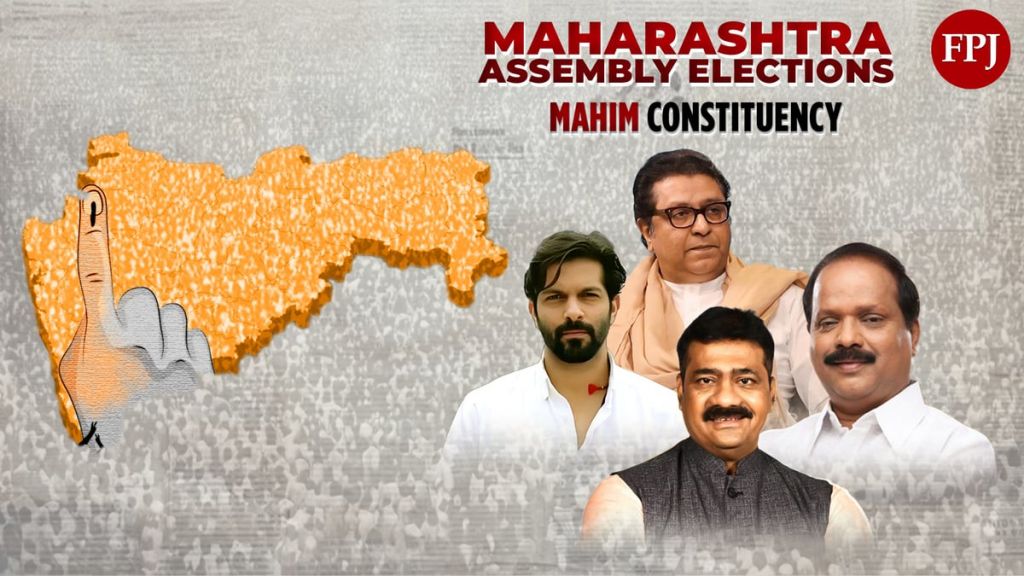
The upcoming Maharashtra Assembly elections 2024 are set to be a litmus test for Maharashtra Navnirman Sena (MNS) chief Raj Thackeray, as he fields his son, Amit, in Mumbai's prestigious Mahim constituency.
लोकहिताच्या प्रयत्नांना यश...!
— Amit Thackeray (@amitrthackeray) November 6, 2024
माहीम विधानसभा मतदारसंघामध्ये प्रचारानिमित्त प्रभाग क्र. १९१ येथील एम. टी.एन.एल. मार्ग,बावरेकर मार्ग,गोखले रोड आदी परिसरात भेट देऊन मतदारांशी संवाद साधला. आजवर सातत्याने विकासाची दृष्टी ठेवत लोकहिताच्या कृतीने केलेल्या प्रयत्नांना यश मिळते आहे. pic.twitter.com/E6oGcHF9L1
The 32-year-old Amit faces a tough triangular battle in his electoral debut, contending with Shiv Sena's Sada Sarvankar, a three-time MLA from Chief Minister Eknath Shinde's faction, and Mahesh Sawant, fielded by Uddhav Thackeray’s Shiv Sena faction. Although the BJP has pledged support to Amit, Sarvankar and Sawant's long-standing presence in the area means victory will not come easily for the MNS candidate.

With voting scheduled for November 20, political observers are asking if this could mark MNS's revival after years of decline. Amit’s candidacy is a significant move for MNS, yet the party’s success in this election remains uncertain. The MNS's performance in 25 of Mumbai’s 36 seats will ultimately decide its relevance in Maharashtra politics.
Hemant Desai, a political analyst, notes, "The MNS has lost its credibility. Though it may win four to five seats, the party has lost much of its glamour and popularity. This also appears to be a BJP strategy to field MNS candidates against Uddhav's Sena to weaken its prospects."
Background of MNS
Raj Thackeray, nephew of the late Balasaheb Thackeray, founded the MNS in 2006 after splitting from his cousin Uddhav Thackeray’s Shiv Sena. Known for its strong regional and Marathi pride, the MNS quickly resonated with urban voters, especially in Mumbai, by advocating for local interests amidst rising migration to the city.
The MNS achieved its first major success in the 2009 Maharashtra Assembly elections, securing 13 seats and gaining a strong presence in the state legislature. However, its influence waned in subsequent elections, as MNS lost seats in both 2014 and 2019.
Strongholds and decline
Historically, MNS has had strong support in Mumbai and surrounding areas. Yet since 2009, the party’s influence has diminished. Contributing factors to MNS’s decline include internal struggles, limited leadership beyond Raj Thackeray, and intense competition from both Shiv Sena factions. Despite these setbacks, MNS continues to field candidates in urban areas, hoping to capitalise on discontent with established parties.
Amit Thackeray’s candidacy and challenges
Amit Thackeray’s candidacy in Mahim, a constituency with a notable Marathi-speaking population, is a calculated move to revitalise the MNS’s urban appeal. Mahim was once an MNS stronghold when it won the seat in 2009, however, it lost here to Sarvankar in 2014 and 2019.
Despite MNS's efforts, Sarvankar remains a formidable opponent, having secured Mahim with 61,337 votes in 2019 and 46,291 votes in 2014. With his back-to-back victories, Sarvankar aims for a third consecutive win. Confident of his support from the Muslim population, which comprises around 13.2% of Mahim’s voters, Sarvankar pointed to MNS’s “demolition of a dargah” as a divisive factor: “The Muslim community will not vote for the MNS, as it demolished their dargah,” he told the media.

“I am a Shiv Sena candidate, carrying forward Balasaheb’s ideology. Senior leaders of the Mahayuti have blessed me. The MNS is not part of the Mahayuti in the assembly election,” he added.
Given MNS's previous performance, Amit faces a challenging battle this time.
MNS’s election track record
MNS’s performance has fluctuated, with its 2009 success followed by a steep decline in 2014, securing only one seat. The 2019 elections were another low, as the MNS struggled against the growing dominance of Shiv Sena and BJP in the state. With no significant wins in recent years, MNS now aims for a comeback.
Key issues and voter support
MNS initially gained popularity by championing regional pride and advocating for Marathi-speaking people in Mumbai. Its focus on local job creation, infrastructure, and controlled migration resonated with voters dissatisfied with Shiv Sena’s performance. Raj Thackeray’s charisma and promises to support local youth further bolstered the MNS’s urban support base.
2024 election promises
The MNS’s core agenda for the 2024 elections centres on protecting Marathi interests, improving urban infrastructure, and expanding employment opportunities for locals. MNS also aims to strengthen Mumbai’s role in Maharashtra’s political and economic decisions.
Raj Thackeray's son & MNS candidate from Mahim, Amit Thackeray says, "I am getting a lot of support from the public and I believe in doing door-to-door campaigning...I will work for the development of my constituency..."#MNS #MaharashtraElection2024
— Journalist Scoop (@bestbike2023) November 1, 2024
pic.twitter.com/MsKnJgMmn1
Chances of winning
Amit Thackeray’s chances remain uncertain given the competitive landscape in Mahim. His success largely depends on MNS’s ability to mobilise its traditional voter base and capitalise on local dissatisfaction with established parties. Yet, the lack of alliances and MNS’s dwindling influence in Mumbai politics make victory unlikely.
MNS in the current political landscape
MNS stands at a crossroads in the 2024 Maharashtra elections, facing fierce competition from both factions of Shiv Sena, BJP, and Congress. While MNS retains some support in Mumbai, its prospects for expanding beyond these areas are limited. Also, its struggle to adapt to the shifting political landscape and attract younger voters remains a significant challenge. Raj Thackeray hopes to revive MNS’s fortunes, but his son’s debut may not be enough to reshape the party’s future singlehandedly.